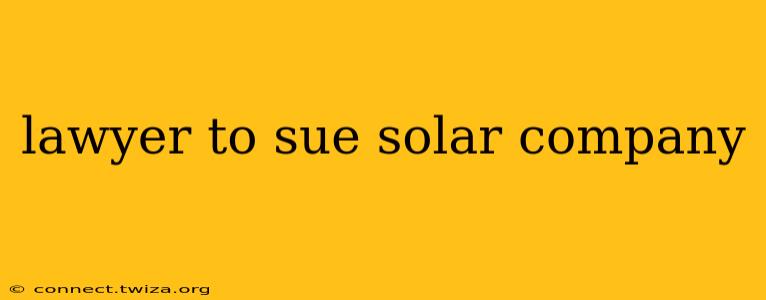Considering legal action against a solar company can be a stressful experience. This guide explores when hiring a lawyer is necessary and the key factors to consider before initiating a lawsuit. Navigating the complexities of solar contracts, installation issues, and performance disputes requires expertise. This article aims to provide clarity and empower you to make informed decisions.
Why You Might Need a Lawyer to Sue a Solar Company
Several situations may necessitate legal counsel when dealing with a solar company. These include:
-
Breach of Contract: If the solar company fails to meet the terms outlined in your contract – such as delayed installation, incorrect equipment, or failure to obtain necessary permits – a lawyer can help you enforce your rights. They'll understand the nuances of your contract and can build a strong case for compensation.
-
Defective Workmanship/Equipment: Problems with the installation, faulty equipment leading to system malfunctions, or subpar performance compared to what was promised are significant issues. A lawyer can help you determine if the issues are due to negligence or breach of warranty.
-
Misrepresentation or Fraud: If the solar company made false claims about the system's performance, energy savings, or financial incentives during the sales process, you might have grounds for a lawsuit. A lawyer can investigate these claims and build a case for damages.
-
Unresolved Complaints: If you've tried to resolve issues with the solar company directly through their customer service department or through mediation, but have been unsuccessful, a lawyer can help navigate the legal process.
-
Safety Hazards: If the solar panel installation presents a safety risk, a lawyer can help you address the immediate danger and pursue legal action for negligence.
What Types of Damages Can You Recover?
The damages you can recover from a successful lawsuit against a solar company depend on the specifics of your case. Possible compensation may include:
- Repair or Replacement Costs: This covers the expenses associated with fixing defective equipment or redoing faulty installation work.
- Financial Losses: This can include lost energy savings, increased energy bills due to system malfunction, or other financial losses directly related to the solar company's failures.
- Punitive Damages: In cases of gross negligence, fraud, or willful misconduct, the court may award punitive damages to punish the solar company and deter similar actions in the future.
- Legal Fees: Your attorney's fees can often be recovered as part of the damages awarded.
What Should I Do Before Hiring a Lawyer?
Before contacting a lawyer, gather all relevant documentation:
- Your Solar Contract: This is the most crucial document.
- Communication Records: Emails, letters, and any other communication with the solar company.
- Photos and Videos: Documenting the problems with the system is essential.
- System Performance Data: Gather data showing the system's underperformance compared to what was promised.
How Do I Find the Right Lawyer?
Finding the right lawyer is crucial. Look for attorneys specializing in consumer protection, contract law, or construction law. You can:
- Ask for Referrals: Contact friends, family, or colleagues who have had similar experiences.
- Use Online Legal Directories: Many online resources can help you find qualified lawyers in your area.
- Check Bar Association Websites: Your state's bar association website might offer resources for finding attorneys.
Remember, consulting with a lawyer is a critical first step. They can assess the merits of your case, explain your legal options, and guide you through the legal process.
What are the Costs Involved in Hiring a Lawyer?
Lawyers typically use different billing methods such as hourly rates, contingency fees (a percentage of the settlement or judgment), or flat fees. Discuss the fee structure upfront to avoid surprises.
What Happens After I Hire a Lawyer?
After hiring a lawyer, they will investigate your case, gather evidence, and advise you on the best course of action. They will handle all communication with the solar company and represent you in negotiations or court proceedings.
By carefully considering the information in this article, you can make informed decisions about whether to pursue legal action and how best to approach it. Remember, seeking professional legal advice is crucial when dealing with complex legal matters.
